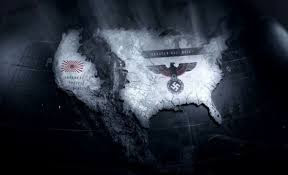It was years and years ago – perhaps as many as fifteen – that I first travelled to Toronto. It was February and I’d been given to understand that the winter was cruel in that part of the world, with eight-foot snow drifts and most of the life of the city taking place underground. Imagine my delight when I turned up to blue skies and balmy temperatures, with only small traces of snow still lying around. Why, I even went for a walk along Lake Ontario (OK, not in shirtsleeves) and I think the word to describe it is charming.
Funnily, I’ve been back once more since, again in February, and again to the same weather. So I enjoy informing Canadian friends of the pleasure I’ve had enjoying the mild winters of Ontario.
At that time, Borders had opened few I any bookshops in England – certainly I hadn’t come across any. Later of course they mushroomed, all replete with their inbuilt Starbucks, offering a satisfying experience of being able to browse huge numbers of books and then have a coffee. Satisfying, that experience, but not sufficiently to resist the competition of Amazon – order the book from the comfort of your own couch, make your own latte and avoid all the hassle of traffic and finding a parking spot. So like mushrooms they opened, and like mushrooms they vanished, without even filling an omelette.
Since it was all new to me, I took great pleasure in spending a couple of hours in a huge Borders (with coffee, of course) in central Toronto. And inevitably bought three or four books. But considerations of economy, and luggage weight, made me put back on the shelf one that had attracted my attention.
Inevitably, once I was home, I decided that of all the books I’d looked at, that was the one I should have taken.
Now roll forward a few years, to January 2006. Danielle and I visited New Orleans, just five months after the havoc wreaked by Hurricane Katrina. Our hotel room was up high, and everywhere we looked we could see blue sheets on roofs that had been stripped of their tiles. The streets smelled distinctly of mould, like a damp cellar that’s been neglected too long. And everywhere one could feel the shortage of people – restaurants all had signs up, “looking for cooks – se busca cocineros” or similar.
 |
| New Orleans, returned to life |
A little way from the centre, we found a pleasant bookshop. Not a huge affair like the one in Toronto, but something much more comfortable and human in scale. It suddenly occurred to me that they might have that book I’d failed to buy.
There were two women in their thirties running the shop. All bookshops, at one time, seemed to be run by two, sometimes three, women aged something between 30 and 60. They were always polite, friendly and fiendishly well-informed.
“I was looking for a book,” I started, always an intelligent way to open a question in a bookshop, “and I don’t remember what it was called, but it seemed to be contrasting the lives of Thomas Jefferson and John Marshall… I’m sorry, I know that’s pretty vague…”
“Do you mean James F. Simon’s What kind of nation?” asked the thirtyish woman, in her glasses and cardigan (did I say they always wore glasses and cardigans?) “I think we have it in stock.”
She marched me over to the other side of the shop and knelt at a low bookshelf.
“Yes, here it is,” she told me as she handed over a copy of the very book I was after.
Now, last month I finished listening to, rather than reading – I’m into audio books these days: they’re great when walking a dog or vacuuming a floor – Lincoln and Chief Justice Taney which, like the earlier book, compares a president with a Supreme Court Chief Justice. It’s an interesting formula, because we tend to know a little about Presidents, but usually next to nothing about judges. And yet they can fundamentally mould the direction of a nation.
That was certainly true of John Marshall, a last minute appointment by the last Federalist President John Adams before he handed over to his nemesis (but also friend – yes, it’s a great story) Thomas Jefferson. By naming Marshall, Adams hoped to leave some Federalist influence to reign in the Republican Jefferson, whom he regarded as dangerously radical. Marshall made a great many key judgements, not least one of his first, which established that the Supreme Court could carry out judicial review – specify, in fact, whether a law was actually legal – a pretty key power.
So it made for a good book. But so was Lincoln and Taney. Lincoln was, of course, the President who won the Civil War and outlawed Slavery. On the way to that happy outcome, he encountered one of the most significant, but infamous decisions of the Supreme Court, made by Roger Taney: the judgement of the Dred Scott case buttressed slavery and, worse still, authorised the principle that blacks in the US could never be citizens and ““…had no rights which the white man was bound to respect.”
Strong stuff, and well handled by the author. Who turned out to be James F. Simon.
I should have guessed, of course, since the formula was so similar. And Simon has the rare distinction of being both a fine historian and a lawyer. So this approach works particularly well for him.
Both books were a pleasure.
But the greatest pleasure of all was to be reminded of the conditions in which I first discovered their author. In the pleasant winter weather of Toronto. And the charm of a stricken city that was quickly emerging from its pain – with intelligence, grace and elegance.













